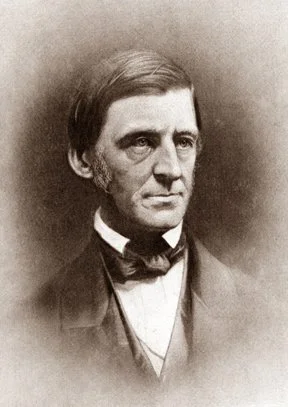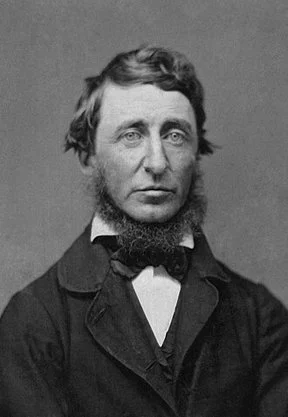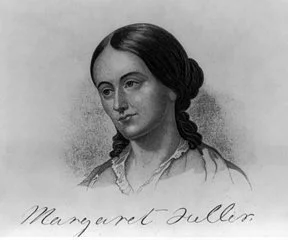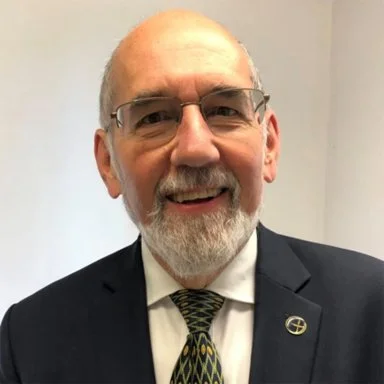Echoes of Transcendentalism in Our Pulpit
By Ed Busch, Church Archivist
I’ve just returned from another trip and was back in the pews this past Sunday. Kathy Lovell’s sermon, “Unitarians, Transcendentalists, and Margaret Fuller” sparked a thought: how often have our ministers spoken about transcendentalism and its influence on Unitarian Universalism?
Kathy Lovell during her sermon on August 24, 2025.
Curious, I turned to our digital archives. For those new to the term, “digital resources” fall into two categories:
Born digital – records that originated on a digital device (computer, tablet, etc.) and were saved directly.
Digitized or reformatted – materials originally created in another form (paper, photograph, film, audio tape, etc.) and later scanned or converted.
A quick search revealed many sermons referencing transcendentalist figures like Emerson, Thoreau, and Fuller—the very voices Kathy had lifted up in her message.
Ralph Waldo Emerson (1803-1882),(source)
Henry David Thoreau (1817-1862), (source)
(Sarah) Margaret Fuller (1810-1850), (source)
Kathy Lovell’s Sermon: The Radical Core
Early in her sermon, Kathy described the heart of transcendentalism:
“Transcendentalism encouraged individuals to look inward to discover truth and meaning, trust their own judgment, and connect with nature for inspiration. Incredibly radical in the 1800s, it was grounded in the belief that all people possessed the capacity to experience divine inspiration if they nurtured the imagination to receive it.”
That radical claim — that each of us can experience the divine directly — is something our own ministers have lifted up from this pulpit.
Rev. Kathryn Bert: Rumi and Revelation
On October 28, 2007, Rev. Kathryn Bert preached “Rumi: 800 Years,” beginning with the poetry of Rumi — from the collection of our own Ruelaine Stokes. From there, she tied Rumi directly to the transcendentalist tradition:
“A confidence in the direct personal experience of God—something our transcendentalist foremothers and forefathers advocated strongly—Margaret Fuller, Ralph Waldo Emerson, Frederic Henry Hedge.”
That same thread ran through Kathy Lovell’s sermon this past week. She reminded us that this radical idea is now embedded in our UU Principles:
“The living tradition which we share draws from many sources, including direct experience of that transcending mystery and wonder affirmed in all cultures, which moves us to a renewal of the spirit and an openness to the forces which create and uphold life.”
Concord, Controversy, and Courage
In her November 16, 2008 sermon “The Unitarian Controversy: Shaking Things Up,” Rev. Bert recalled standing in the Concord, Massachusetts, home of Rev. William Emerson Sr., looking out toward the Old North Bridge where Ralph Waldo Emerson later wrote of the “shot heard round the world.”
Kathy, too, spoke of this history — reminding us that transcendentalists were not only dreamers, but also doers who placed themselves in the stream of history. She described how the early 1800s split families, churches, and communities over questions of God’s nature and religious authority, leading to the very Unitarian Controversy Bert preached about:
“These debates were raging in New England in the early 1800s. Families were split apart by the controversy which ultimately led to the separation of New England's town churches into liberal Unitarian and Orthodox Congregational, along with the more fundamentalist churches.”
Both sermons made clear: transcendentalism was not simply about personal spirituality — it was about courage to “shake things up” in faith and society.
Covenant and Spiritual Friendships
Another strong tie between Bert’s and Lovell’s sermons is the theme of spiritual friendship and covenant. Kathy described how Fuller, Peabody, and their companions practiced “the art of forming and maintaining spiritual friendships which transcended differences of gender, race, social status, theology.”
Rev. Bert had framed this in 2008 as part of our identity:
“Basic to our liberal religion is that we renew it constantly. We welcome new prophets and new ideas, new feelings, and new ways. We dare to shake things up… If ever the world needed a turning around, it is now.”
Both suggest that our covenant community is not about agreement, but about commitment to remain in relationship even when we disagree — an idea with deep roots in our history.
The Prophetic Tradition: Parker, King, and Us
Kathy concluded her sermon by drawing a line from Theodore Parker, the radical Unitarian minister, through Abraham Lincoln and Dr. Martin Luther King Jr., to us. She reminded us that when we quote “the arc of the moral universe is long, but it bends toward justice,” we are unknowingly echoing Parker’s words.
Rev. Bert had also lifted up this prophetic lineage in 2008, the year Barack Obama was elected president—a moment when Parker’s words about justice bending through history felt especially alive:
“We have many prophets in our faith—from Jesus to Thoreau. Emerson tells us all in his Divinity School Address to dare to love God without mediator or veil. And by so doing, we all become prophets with visions of our own.”
Here again the sermons echo one another—past and present reminding us that we, too, are called to be prophets, bending our lives toward justice and beloved community. The same words that inspired King, and were invoked in hope during Obama’s election, still resonate in today’s struggles for racial equity, democracy, and freedom.
The Conversation Continues
In February 2019, Rev. John Buehrens (former UUA President) spoke at our congregation about his forthcoming book Conflagration: How the Transcendentalists Sparked the American Struggle for Racial, Gender, and Social Justice. Kathy quoted him in her sermon as well, describing how the transcendentalists’ disruption sparked what he called a “second revolution.”
John Buehrens (source)
That “revolution” continues in our own time. Whether through Fuller’s demand for women’s equality, Emerson’s call for direct experience of the divine, Parker’s uncompromising abolitionism, Bert’s reminder to “shake things up,” or Kathy’s recent call to live into covenant and beloved community—the transcendentalist spirit remains alive in our pulpit and our congregation.
Invitation
Do you remember other sermons that touched on transcendentalism, Emerson, or Fuller? Please share your memories and reflections with the Archives at uucgl.archives@gmail.com. Together, we are weaving a living tradition—one of spiritual friendships, bold truths, and the prophetic call to justice.
[Edit help and suggestions provided by ChatGPT]
Sources:
Rumi: 800 years preached for the Unitarian Universalist Church of Greater Lansing by the Rev. Kathryn A. Bert , Poems read by Ruelaine Stokes on October 28, 2007.
The Unitarian Controversy: Shaking Things Up preached* for the Unitarian Universalist Church of Greater Lansing by the Rev. Kathryn A. Bert, November 16, 2008.
UU Church of Greater Lansing weekly email, January 4, 2019.
“Unitarians, Transcendentalists, and Margaret Fuller”, August 24, 2025, https://www.youtube.com/watch?v=JTG0d80dTSk&t=1505s .
—————————
About the Author
Hi, I’m Ed Busch, the writer behind these blog posts exploring the history of UU Lansing. After retiring in 2023 from a 15-year career as an Electronic Records Archivist at Michigan State University’s Archives & Historical Collections, I’m thrilled to dedicate my time to sharing our church’s rich history.
I hold a Master’s in Library and Information Science, specializing in archival administration, and my academic background also includes a degree in Fisheries and coursework in Computer Science. Before shifting to a career in archives, I worked across diverse fields, including fisheries, aerospace, and IT.
My wife, Leigh White, and I have been part of the UU Lansing community since the early 2000s and became members in 2006. I’ve been actively involved with the church archives since 2007, and both of our daughters enjoyed growing up in UU Lansing’s Religious Education (RE) program.
I look forward to connecting with you through these blog posts as we delve into the stories that have shaped UU Lansing over the years.





